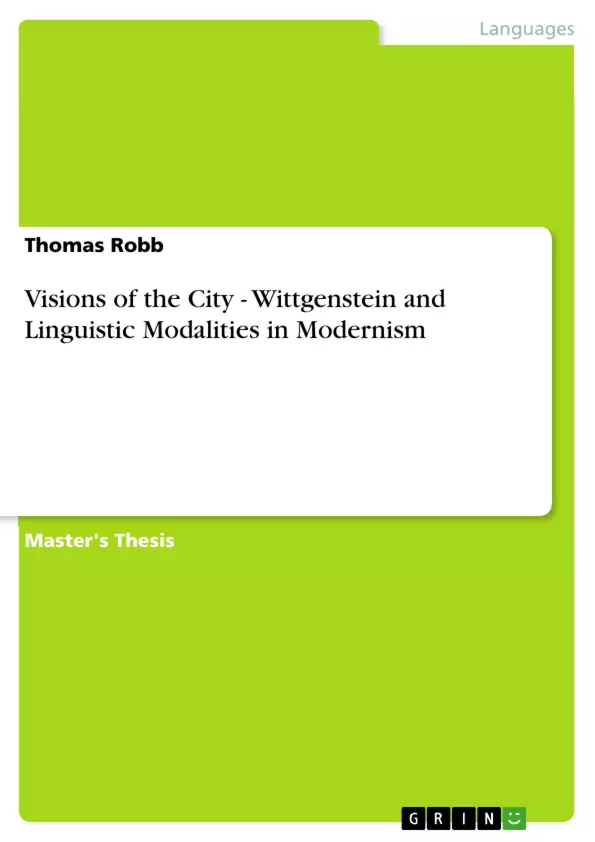This thesis asserts that Ludwig Wittgenstein’s philosophy, expressed primarily through
his formulation of the private language argument, offers a uniquely illuminating perspective to
the works of Virginia Woolf and T.S. Eliot. The very idea of the private language argument is
inherently built upon a limit. Through it, Wittgenstein poses a paradox to us: in examining the
limitations of language, it is impossible to determine what the limit is from the angle at which
language no longer plays a role. In this light, language is the currency of comprehension. In
examining the efficacy and dilemmas of language, its meaning, its use, its necessity of public
rules and one’s subsequent acknowledgement of them, Wittgenstein’s later work, Philosophical
Investigations, is employed throughout the body of this thesis. This paper argues that it is not
enough to merely consider the fact that Woolf and Eliot take an ethical stance (an action-based
position formed from their own interactions with the city of London) upon the epistemological
problems of private language; rather, it is more useful to assert the potency of the two authors’
differing solutions to the problems of language that are found in their respective works.
Inhaltsverzeichnis (Table of Contents)
- I. Introduction
- II. Wittgenstein's Private Language and its Use
- III. Woolf, Eliot, and the Parallax of Private Language
- IV. Conclusion
Zielsetzung und Themenschwerpunkte (Objectives and Key Themes)
This thesis argues that Ludwig Wittgenstein's philosophy, particularly his private language argument, offers a unique perspective on the works of Virginia Woolf and T.S. Eliot. The paper examines the authors' differing solutions to the problems of language that are found in their respective works. It aims to show that the city, with its allure and paradoxes, serves as a space of potentiality in both Woolf's and Eliot's writings, highlighting the complex relationship between language, knowledge, and intimacy.
- Wittgenstein's private language argument and its relevance to modernist literature
- The city as a space of potentiality and the knowledge of intimacy
- The interplay of language, meaning, and public rules in the works of Woolf and Eliot
- The exploration of ethical stances in response to the epistemological problems of private language
- The influence of Wittgenstein's Philosophical Investigations on understanding modernist literature
Zusammenfassung der Kapitel (Chapter Summaries)
- Chapter II: Wittgenstein's Private Language and its Use: This chapter focuses on Wittgenstein's private language argument, exploring its implications for understanding language and the limitations of subjective experience. It examines how Wittgenstein's concept of language as a public phenomenon challenges the notion of private meaning.
- Chapter III: Woolf, Eliot, and the Parallax of Private Language: This chapter analyzes the works of Virginia Woolf and T.S. Eliot through the lens of Wittgenstein's philosophy. It examines how their literary representations of the city reflect the challenges of communication, knowledge, and the search for intimacy within a complex urban environment.
Schlüsselwörter (Keywords)
This thesis focuses on the intersection of philosophy and literature, specifically exploring the application of Wittgenstein's private language argument to modernist literature. It investigates the role of language in shaping perceptions of the city, the complexities of intimacy, and the ethical stances taken by Woolf and Eliot. Key terms include private language, public rules, knowledge of intimacy, city as a space of potentiality, modernist literature, and the works of Virginia Woolf and T.S. Eliot.
Frequently Asked Questions
How does Wittgenstein's philosophy relate to modernist literature?
Wittgenstein's private language argument provides a unique lens to examine the epistemological problems and communicative challenges found in the works of authors like Virginia Woolf and T.S. Eliot.
What is the central paradox of the private language argument?
It posits that while examining the limitations of language, it is impossible to define where the limit is from an angle where language no longer functions, making language the essential currency of comprehension.
What role does the city play in the works of Woolf and Eliot?
The city of London serves as a space of potentiality and ethical interaction, where the authors explore the complexities of intimacy and the search for meaning in an urban environment.
Which work by Wittgenstein is primarily used in this thesis?
The thesis primarily employs Wittgenstein's later work, "Philosophical Investigations," to analyze language use and public rules.
What are the key themes explored regarding Woolf and Eliot?
Key themes include the parallax of private language, the knowledge of intimacy, the necessity of public rules, and the ethical stances taken in response to linguistic dilemmas.
- Citation du texte
- Thomas Robb (Auteur), 2010, Visions of the City - Wittgenstein and Linguistic Modalities in Modernism, Munich, GRIN Verlag, https://www.grin.com/document/178705



